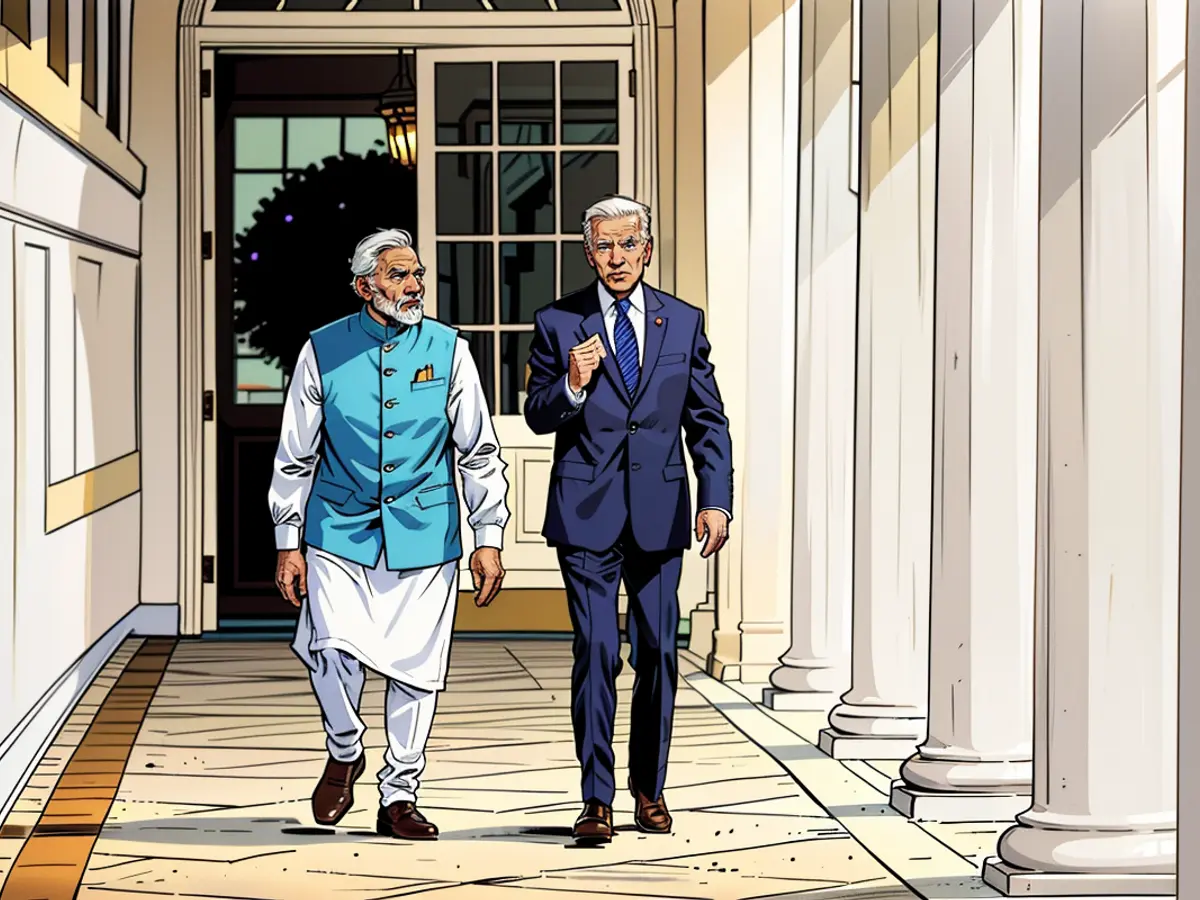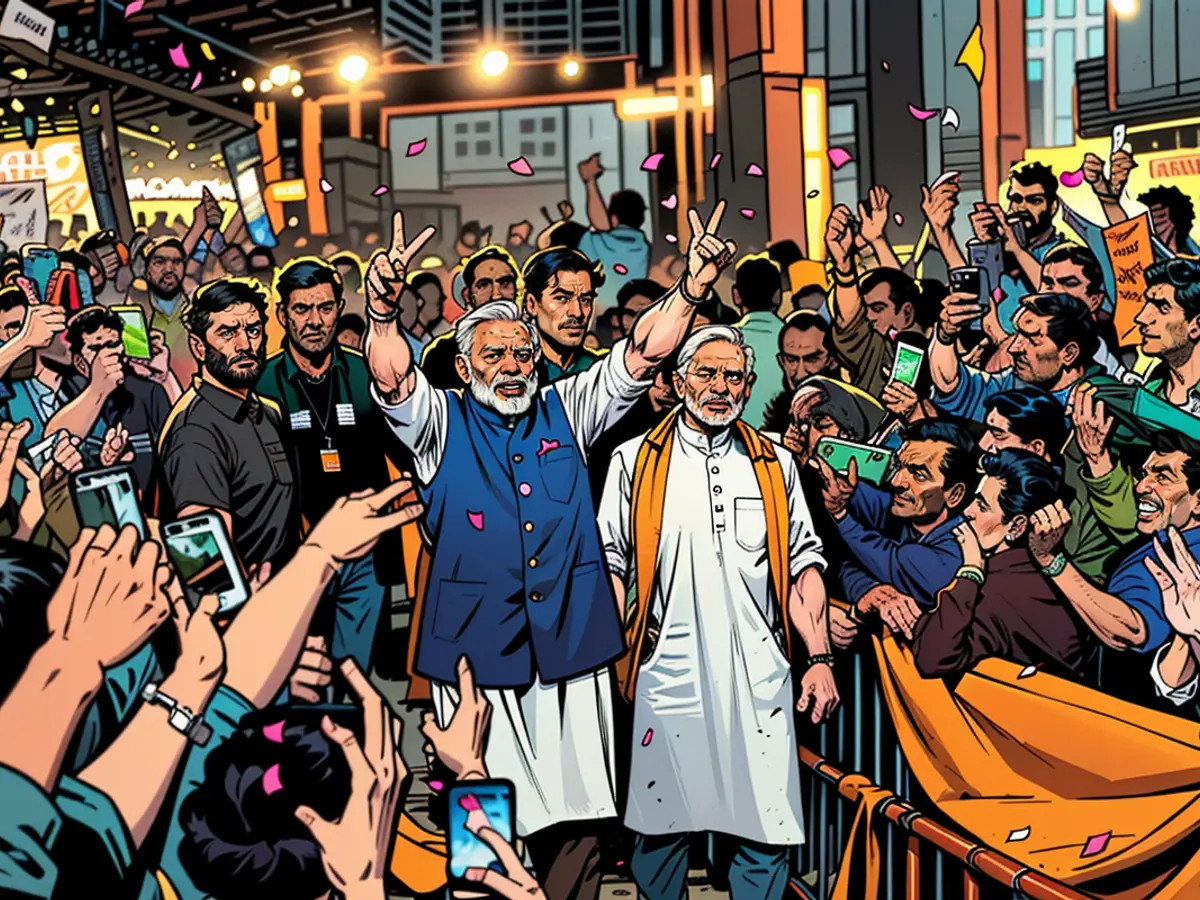India's Modi and his Hindu-nationalist party secure five more years in control. How does this impact the global landscape?
The prime minister, who has managed to secure a rare third term in office, has positioned India and its rapidly growing economy as a crucial player on the global stage, tackling issues like climate change and development, all while solidifying New Delhi as a significant security partner for the United States and an emerging leader of the Global South.
But while the current Indian prime minister's victory gives him and his Hindu nationalist Bharatiya Janata Party (BJP) another five years to elevate India's status on the global stage, it also places him in a vastly different position from the one he held during his initial decade in power.
In these elections, Modi and his BJP came up short of the anticipated heavy majority and will be forced to rely on coalition partners in order to form a government.
This sudden setback has been seen as a major blow to the prime minister and his party, who have found themselves under fire for alleged incidents of Islamophobia, religious violence, civil liberty rollback and failure to address unemployment issues.
Now, Modi must dedicate a significant amount of his time to preserving the integrity of his government, which is comprised of various political factions with diverging agendas, according to T.V. Paul, the author of "The Unfinished Quest: India's Search for Major Power Status from Nehru to Modi."
"The ambition of India wielding its weight around the globe may be less feasible for the time being, given that foreign policy matters did not sway the voters' decision as much as anticipated," says Paul.
International Relations
There is one aspect of India's international ambitions that's unlikely to change under Modi's new term: its relationship with the United States. This alliance has bolstered Modi's reputation as a dynamic force in geopolitics.
India has become a key security partner for the US, a central player in its Quad security alliance with Japan and Australia, and a growing collaborator in high-tech and defense due to shared concerns regarding the increasingly influential China.
U.S. President Joe Biden sent Modi a gleeful message of congratulations upon his re-election, heralding the US-India friendship as "only getting better as we chart a course for an unlimited future."
This bond is expected to only strengthen in the near future, given the shared concerns between the two nations over regional stability and the burgeoning defense cooperation between them.
"We can expect a more assertive India aligning closely with US interests in the Indo-Pacific and expanding technological collaboration," said Farwa Aamer, the director of South Asia Initiatives at the Asia Society Policy Institute in New York.
Although relations between New Delhi and Washington have warmed in recent years as part of Modi's effort to maintain his country's policy of strategic autonomy, which seeks a non-US-dominated global order, a question that remains is how his third term might impact the ongoing concerns in America about a regression in civil liberties in India under his regime – also allegations that the BJP is trying to suppress the Muslim minority population of over 200 million.
India has faced recent scrutiny over instances of extraterritorial action, which raise questions about the dangers of the nation's expanding confidence, assertiveness, and commitment to international norms under Modi.
In addition to that, Indian Prime Minister Justin Trudeau in September expressed concerns about "credible allegations" linking India to the murder of a Canadian citizen and leading Sikh leader. New Delhi responded angrily, accusing Canada of sheltering terrorists and not acting against extremists.
Two months later, American prosecutors alleged that an Indian agent was involved in a thwarted plot to assassinate an American Sikh activist. India denied any involvement and set up a high-level committee to interrogate the accusation.
Changing Dynamics
Currently, a significant factor to bear in mind is whether the new government will ramp up or dial back its policies and actions that impact India's relations with its South Asian neighbors.

Analysts predict that Hindu nationalism over the past decade has not only stoked division and violence internally, but has had the potential to exacerbate tensions in the region, especially with Pakistan, a frequent target of BJP rhetoric.
With the BJP's coalition partners pressuring them now, and a reinvigorated opposition challenging the Hindu-nationalist agenda, it remains to be seen how the party will address its coalition partners' interests and check the influence of its nationalist base. The next few weeks will likely shed light on whether Modi and his party will moderate or escalate their rhetoric and posturing.
"If it's just regular politics, it might appear that digs won't be as pointed on various issues," responds Yale University lecturer Sushant Singh. "But, in order to keep its nationalist base engaged, the BJP could actually take the opposite approach," he added. "We'll have to wait and see what political move is made."
Modi's weaker position going into this term could also catalyze more aggressive stances, as there's a pressing need to solidify his nationalist base.
Next, India alleged to carry out airstrikes against a suspected terrorist training camp in an area they consider their border with Pakistan. This came after a tragic car bombing that left Indian paramilitary personnel dead, though Pakistan denies the incident.
According to Fahd Humayun, a professor of political science at Tufts University, the ruling BJP utilizes the dehumanization of Pakistan's image to rally its supporters who adhere to Hindutva, a belief that India belongs to Hindus primarily.
If an embattled Modi administration seeks to appeal to voters in the future, escalating tensions with external threats is a possible route, some speculate.
Given Modi's vulnerable condition, he might find it necessary to respond more forcefully against perceived assaults by China, as analysts anticipate.
Despite being chastised for an allegedly inadequate reaction to strife between India and China along their disputed Himalayan boundary, Modi has thus far been hesitant to trigger conflict with their militarily dominant neighbor.
The world is watching how these circumstances progress in the nearby future.
In the interim, some experts argue that while Modi's electoral success might not significantly bolster him, his country's global influence could already benefit.
"If he's managed to secure a supermajority and advance the Hindu agenda, it could potentially damage India's international stature," says Paul, an author and professor at McGill University in Canada.
Democracy, according to Paul, serves as India's most potent soft power tradition, and its resurgence in these elections may enhance the nation's image among liberal countries.
"India's re-emergence as a true democracy is advantageous for the global order in several aspects, provided Modi plays his cards right," he concluded.
Our CNN associate Rhea Mogul assisted in producing this article.
Don't forget to check out our online writing courses for more tips on paraphrasing. Happy writing!

Read also:
Despite winning another term, Modi's Hindu-nationalist BJP will need to rely on coalition partners, potentially impacting their hardline stance on issues such as civil liberties and Muslim minority rights. This could influence India's relationship with the international community, particularly when it comes to human rights concerns.
India's strong bond with the United States is expected to continue under Modi's third term, with both nations sharing common goals in regional stability and defense cooperation. However, ongoing concerns about civil liberties and India's treatment of minorities could create tension in this relationship.







